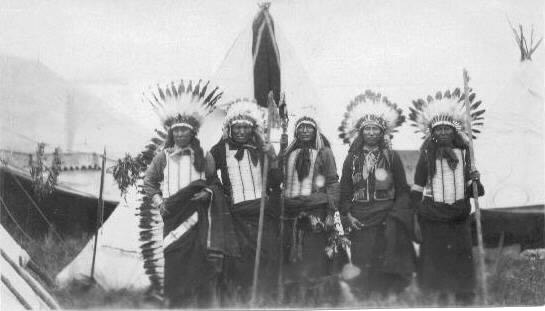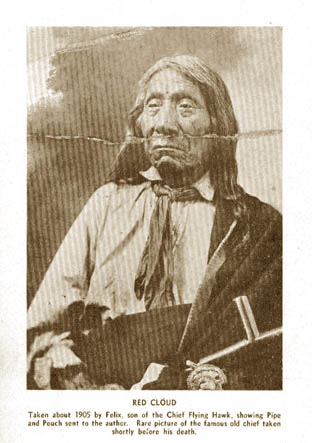| Sioux Chiefs - 1908 L.to R.-Lone Bear, American Horse(Ben), Iron Tail, Iron Cloud, Whirlwind |

|
|
Chapter 1- CHIEF FLYING HAWK'S TALES In the spectacular parades of the Great Wild West Shows of old days Buffalo Bill mounted a beautiful white horse lead the procession. Alongside of him, mounted on his pinto pony, rode Flying Hawk in full regal style, carrying his feathered guidon erect and fluttering in the breeze, while his eagle-quill bonnet not only made a fitting crown but dangled below the stirrups of his saddle. Scalp locks decorated his buckskin war-shirt, and beaded moccasins adorned his feet, for this was the becoming dress for, and carried out the dignity of his high office of Chief on gala day affairs. After the death of the great Scout the old chief travelled with Colonel Miller's 101 Ranch Shows, and for a time with the Sells-Floto Shows, for it was a relief from the hum-drum life in a two-room log cabin in the desolate Bad Lands country. It was during one of his last trips with the big circus that the writer telegraphed to the manager, while stationed at a city in an adjoining state, asking him to put the old chief on the train which would bring him for a few days' visit at the Wigwam, where for many years he had so much enjoyed similar visits. Shortly a reply came. The message read: "Coming. Flying Hawk." The writer's car was there to meet him. Thunderbull, the interpreter, had come with him, for the Chief was ill and they feared to trust him to travel alone. He was driven to a doctor's office for an examination and the physician ordered him to be taken to the hospital, saying he was threatened with pneumonia and must have careful attention. He had been travelling in New England and Canada, and the weather had been cold and wet, which, with the war-dancing, buffalo-chasing and rough-riding, was telling on the health of the old man, now '76. When informed of the doctor's decision, the chief remonstrated; he told of Iron Tail, his old friend, who had been placed in a hospital under exactly similar conditions a dozen years ago, and was sent home in a casket. No, he said, he would not go to the hospital, but wished to go to the Wigwam, where he could be with his friends and those who knew and understood him. At the Wigwam he was at home; he liked the cooking and the sunshine and the open fields and woods, good water, a little sherry wine now and then, and the fresh pure air that was sifted through a mile of green forests seemingly for his benefit. The old man declined all the luxury provided for him in the way of soft mattress, guest-room, bath, rockers and springs, and asked to have the shaggy buffalo robes and blankets put at his disposal on the open veranda. There he made his couch and slept in the starlight, to be wakened by the songbirds and the rising sun peeping from the mountain-tops fifteen miles away. A couple of days of this change to new environment overcame the threatened breakdown, and the Chief showed signs of returning health and vigor. He said he would soon be in the long sleep with Red Cloud and Sitting Bull, and he would now talk about Crazy Horse, and tell all about the Custer fight if the white chief would want it for a paper talk; Thunderbull would help him put it in the white man's words, if the white Chief would write it as he said. For years the old Chief had been importuned by newspaper reporters and by magazine and feature writers to give his own account of what actually took place at the Custer fight, for it was known that he was with Crazy Horse throughout the whole affair and knew more than anyone else about it, but he always declined to be interviewed. Now he was ready to talk, for he had turned over the old ceremonial peace pipe to his friend after fifty years' possession—since Sitting Bull's reign—and he now wished him to have also the history of his life, and the true story of the Custer fight before he went to the last long sleep. And so, on the broad veranda, where the old man could look out into the mountains where the deer and the bears still lived, and where nearby he could see the railroad and highway traffic as overhead roared the airplanes between New York and San Francisco, comfortable chairs and tables, with writing materials, were provided to take down the old Chief's statements exactly as he uttered them in the Lakota dialect and sign language, fully translated by Thunderbull, verified by the chief himself and signed with his thumb-print and by him pronounced "Washta." |
RED CLOUD | |

| Taken about 1905 by Felix, son of the Chief Flying Hawk, showing Pipe and Pouch sent to the author. Rare picture of the famous old chief taken shortly before his death. |
|
|
|
|
|
|
||
| previous page | table of contents | next page |
|
|
||